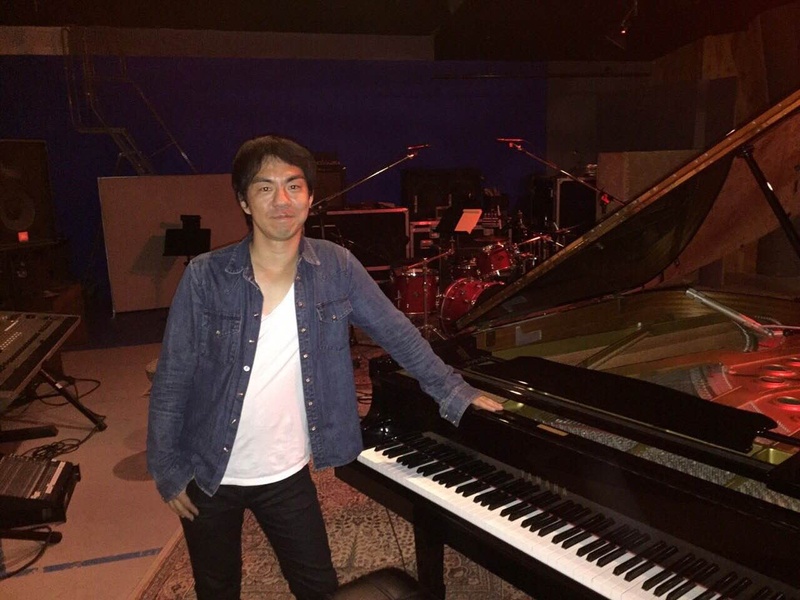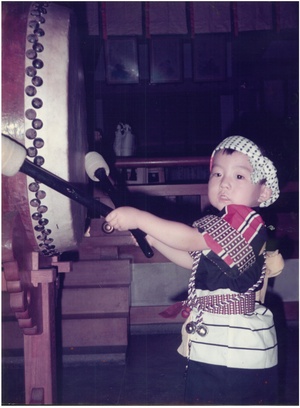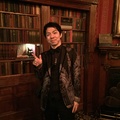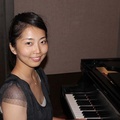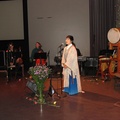With the producer’s special approval, I was allowed into the private recording session for a new pop song written by Masanori Takumi, a well-known songwriter, and music composer for Japanese Anime and Manga series including Koi Kaze, Genshiken, and Claymore. He is now creating music in both Tokyo and Los Angeles.
Since his success in composing for television shows and film, Masanori has also seamlessly crossed over into the J-Pop genre writing songs and having several hits with musical artists in Japan such as Exile, AAA, and KARA, the all girl vocal group who made it to the #1 Billboard spot singing, “Thank you Summer Love.” When one of his songs makes it to the Billboard 100 in Japan or S. Korea, it is not only a major industry accomplishment, but also in Masanori’s words, “A reminder that the many years of hard work and commitment to music are so worthwhile when you can hear your music being played and can share it with others.”
What many do not realize is that the recording sessions for new pop material are actually conceived and recorded in the music capital of the world, Los Angeles. Masanori works regularly in both Tokyo and Los Angeles. In today’s digital world, recording musical tracks can be done in various continents and joined together forming a finished product. It can be described as a positive globalization of music.
This cross-culture hybrid of Japan-meets-LA creates interesting blends of performance, mixed with American production and engineering techniques. This kind of collaboration surprisingly creates new fresh sounds and styles within existing pop genres. The desire to cross-pollinate musically has always been present in music, but only few can successfully accomplish creating end products that make it onto the music charts.
My meeting with Masanori in Malibu, CA
In a recent studio session in Malibu, a prestigious coastal area North of Los Angeles and home to many Hollywood actors and musicians, Masanori comfortably sits with his headset on behind a set of drums playing away on tracks for a song he co-wrote.
When he was done laying down the drum tracks I expected a bass player to walk into the recording room, but Masanori simply put down his drumsticks and picked up an electric bass waiting for him on a stand next to the grand piano. The engineer pushed the record button, and on the first pass Masanori played the bass like it was his primary instrument. I was thinking to myself, “Wait a minute, I thought he was a guitarist?” The producer and everyone in the recording booth was smiling ear to ear, and the producer yelled out, “That’s a keeper, let’s move on.”
At that point I thought someone else would be sitting on piano, but like a child at play, Masanori quickly sprang onto the piano bench and started exercising his fingers with an American song, “The Stars Spangled Banner.” Everyone laughed and he turned and laughed with us through the studio glass. Needless to mention, the piano track was tastefully executed and he finished with his main instrument, the guitar. I had just witnessed a ‘Takumi.’ That is my new expression for ‘a whirlwind of instruments so skillfully played that it knocks you off your feet!’ He mesmerizes all in his presence.
Follow-up interview with Masanori at Sherman Oaks Galleria
You are a multi-talented musician. How is it that you are able to play so many different instruments?
Honestly, I hadn't taken a single lesson on how to play different instruments. I was into music early on in elementary school. Nearly all children in Japan start to play recorder in school and I began to play melodies on my own, and eventually whole songs.
At some point, I joined the brass band at my school and started with trumpet. Then during break time we would have fun exchanging our instruments amongst ourselves, and this was a chance to play another instrument such as drums, percussion or piano.
Later, when I was about 13 years old, I formed a band with one of my classmates, and I chose the drums. And just as we had done before as kids, we playfully exchanged our instruments and I started to play guitar and bass. Playing instruments was kind of my hobby and no one ever pushed me to play guitar and bass, I just looked forward to picking them up and learning more. I have to attribute the progress I made and the interest for music to my parents, and thank them for never pushing me to learn music.
After I became professional, the concept of playing more than one instrument carried into my professional life. I had many opportunities to play multiple instruments. It was when I learned to play piano that I could really understand how to play guitar, bass and drums. And, when I played guitar that I could better understand the piano, drums and bass.
Understanding each instrument I think contributes to overall musicianship, and opens your eyes to the potential contribution of each. And, when you write music you can imagine parts, so it all comes together easier. Working in a creative environment with ultra-talented people allowed me to have a great opportunity to observe the expertise of other musicians on their instruments and pick up some of their chops. That's the reason I can be a multi-player—because of this exposure to talented people, and the opportunity to just pick up another instrument without inhibition.”
When you play your instruments you play with such ease and fluidity. How old were you when you realized your love for music and can you share a childhood memory and who were your childhood influences?
I remember one particular moment when I was really young…about 8 years old and I started to cry when I heard my Uncle Hideki Saiijo singing a song. I was so touched and to this day, I can still remember the exact feeling like it was yesterday. I guess that is the magic of music and emotions working to get in touch with our feelings. That moment is my motivation.
Aside from my interest in music, I was a normal kid, and when I was at home I did other things and practiced music only while I was at school. One of the defining moments that set me on my musical trajectory was when I was 13 years old and saw a music video by YOSHIKI the legendary rock star from X JAPAN. He became my main influence growing up in Japan. He inspired me with great melodies and a fantastic rock spirit!
From that day forward, I decided to become a pro musician with unfounded confidence. I was so excited by YOSHIKI’S drumming and sense of melody and went forward with big dreams like most kids do.
I am happy that I grew up and found my love of music on my own, and would advise that parents expose their children to music, but not push a child. I think the more you push someone to do something, the more they will not like whatever it is you want them to do. So, if a child wants to play, let them play in the way they desire to discover music; it then becomes a personal desire.
You are close with your mother, can you tell us how she supported your pursuit of a career in music?
Your readers may already be acquainted with my Uncle Hideki Saijo who is one of Japan’s most famous singers.
He is my mother’s brother, and coincidently, my mother also has an innate ability to always tell me what audiences feel for music even though she is not musician. For example, when I was 20 years old, I wrote my first song and recorded it in the studio and had her listen to it. She said in a puzzled voice, "Where is the chorus?" I was disappointed, but realized what was the most important aspect of the song for the audience. I think we have to respect what the audience wants to hear, for they are the ones who support our music and allow us to live as musicians by buying our music, and attending concerts, etc. My mother’s opinion turned out to be a turning point in how I thought about songwriting. Her response actually affected my way of thinking, and I changed my approach from then on. I can laugh at it now, but I don’t think I was laughing then…(He looks at me with a big smile)
How long did it take before you felt you were ready for the professional world of composing for anime and manga? In America we have an understanding, or expression that artists must ‘pay their dues,’ meaning the road to success is not always that easy, and sometimes you must work for less, or do work you are not really interested in doing in order to get to the next level.
I worked with a group in Japan called Siren, and when that project ended, some people I had met introduced me to a music industry agent. I have always been writing and producing my own songs and instrumental music, so by the time I was connected with the agent, I was ready to go. The timing was right. I think success has to do with both talent and timing, and making the right choices.
I think the main thing is to do what you love to do, and in my case it has always been music. You get the confirmation from your professional peers mostly that what you do is exceptional, or special enough for you to keep going and pursuing a musical career. When you can surround yourself with professionals who can be constructive and honest, and they keep lifting you up to the next level, that is the ultimate situation for any evolving young musician. You have to be able to work with groups of people and that has always been a pleasure for me. I really enjoy meeting new producers, artists and musicians in Japan and the U.S.
What was your journey like, and what do you consider your big break onto the music scene in Japan?
I started writing songs as a pro when I was 20 years old and my first job as a composer in the world of anime came 5 years later. My big break in pop came when one of my pop ballads called "Kawaranai mono" was sung by EXILE, Japan’s most famous boys band. It was very popular and was the song that elevated me to the next level as a J-Pop composer. The album that included that song sold more than 1,000,000 copies in Japan. That one particular song changed my creative heart very much because they were the best singers at the time, and that still holds true today. They are still very popular. Having a hit with them boosted my confidence and creativity levels.
What were some of your favorite projects so far, and why?
I have enjoyed working on the Sly & Robbie reggae music project, and look forward to the next Grammy nomination! It truly is a great opportunity to join such amazingly gifted artists, as well as an exceptional creative team from Sony Japan. Reggae music is so positive and uplifting and brings a smile to everyone’s face no matter where you come from. Most everyone likes Reggae because it makes you want to dance, you know?
Your song “Call” was nominated for the Japanese Grammy, the Record Taisho; I heard the song and it's a very upbeat dance song. How do you write this style of music?
While writing, “Call,” I first I set up the BPM, or rhythm pattern and tempo, and later I wrote the chord progression. I then sang the top line or melody, like an American co-writing style for the first time. I usually write the top line first, but in the case of this song I needed to create a beat ambiance so I did it differently.
Almost all the time my top line (melody) comes from my head in a particular section of chorus. But, sometimes I have no choice but to create a top line with an instrument if I can't come up with a melody in my head.
What was it like when you first heard that the song, “Call” was gaining momentum?
I first heard about the song’s upcoming release and anticipated success when I was in LA in August of 2012. It was my first time driving a car alone around in LA and I was cruising along the Pacific Coast Highway in Malibu when my manager called me from Japan. I was so excited to hear the news and went up on the website right away to see all the excitement and ‘buzz’ about the new album.
And after it was released, it was about the same time of the announcement of nominees for the Japanese Record Awards called "Record Taisho.” It was wintertime and I recall that night well. I remember I had never thought that my song would be nominated, and I was casually waiting for the news of nominees to be published on the web without any expectations. Seriously, I was not keeping an eye out for my own song. And, when I went to the Record Taisho site I was so surprised that my song made the list! Even though it was midnight, I couldn't help calling my mom and telling her about the news. She was overwhelmed with joy!
© 2015 Rachelle Cano


